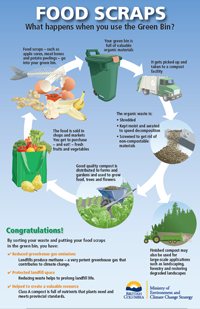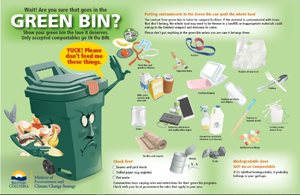Compost in B.C.
Compost is the end product of decomposed organic matter, like food waste and yard waste. It is high in nutrients and is a key component in closing the loop in the management of organic waste. Compost from compost facilities is a high-value and environmentally-responsible product.
- General Composting Best Management Practices (PDF)
- Download a full resolution copy of the What goes in the bin poster (PDF, 14.6 MB)
- Download a full resolution copy of Food Scraps – waste not poster (PDF, 9.61 MB)
Compost use
The B.C. government encourages the use of compost for both public and private sector projects. This fact sheet provides guidance on procuring compost, and includes the benefits of compost and some suggested uses.
Compost facility requirements
2016 amendments to the Organic Matter Recycling Regulation (OMRR) require composting facilities that process food waste and/or biosolids, and possess the design capacity to produce 5,000 tonnes or greater of finished compost per year, to obtain a permit or operational certificate. A summary of the amendments to the regulation and guidance are available on the Regulation & Guidance page.
Apply for a permit or operational certificate
Please visit how to apply for a waste discharge authorization for additional details.
Application review
Once submitted, the application package will be reviewed by staff, and applicants will be contacted if more information is needed. The permit adjudication process is a public process and timelines are not fixed. The process may take several months or longer, however the more complete the application and responsive the proponent, the quicker a decision will be made.
During the permit application process, compost facilities will still be required to abide by the OMRR.
For affected facilities, the permit process is replacing the OMRR notification process. However, facilities will still be required to abide by both OMRR and the permit terms and conditions.
Connection with Local Government
Composting facilities may operate with an approved Waste Management Plan under local government. If a facility is doing so, and has an approved Operational Certificate in place, it is not required to get a permit.


